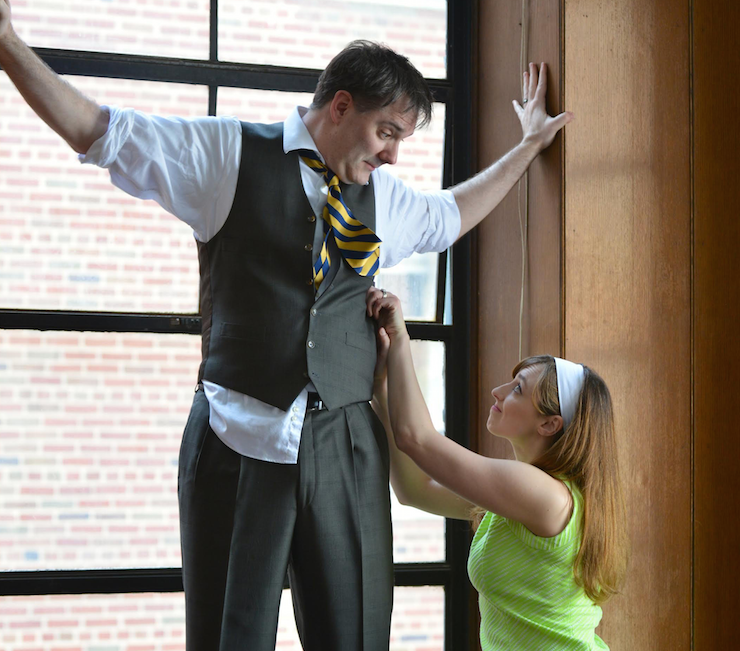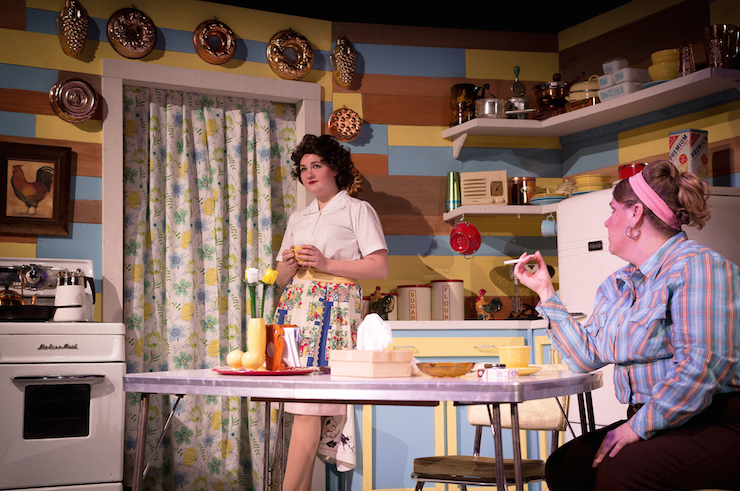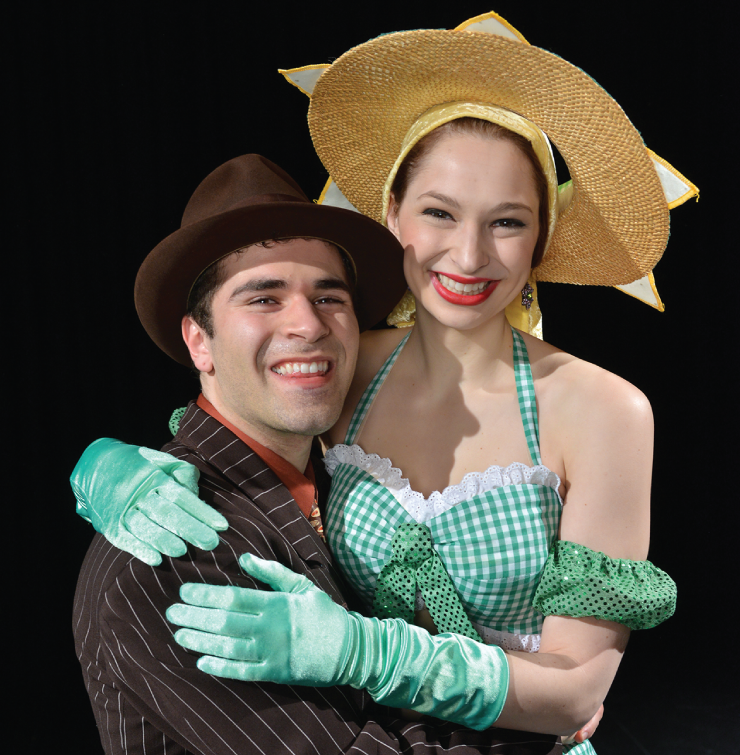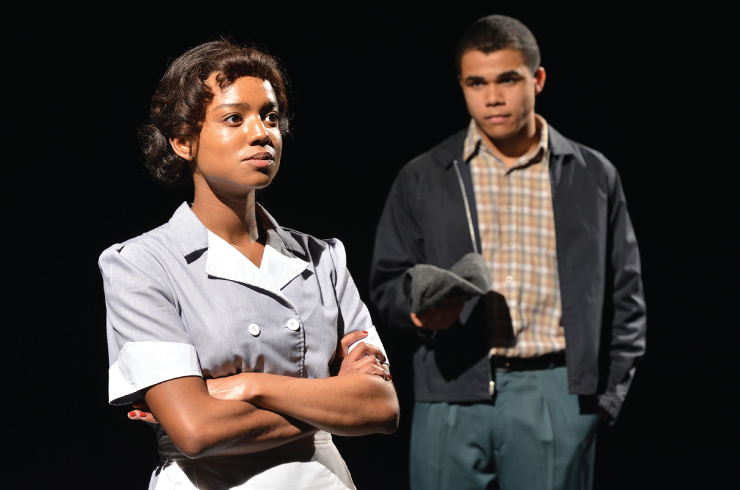Review: Purple Rose gives first class world debut for Gaps in the Fossil Record

A paleontologist walks on the stage. Behind him is a projection of a famous and enigmatic fossil find. The bones of two ancient bodies are seemingly entwined, facing each other.
Lovers, religious sacrifices, bodies covered in a long ago volcanic eruption? No one knows, everyone has a theory or two.
The paleontologist is an absent-minded professor, a bit of a joker, a man who admits being more comfortable on a dig conversing with ancient bones than in front of a classroom. But he has always been drawn to those dusty bones and their secrets and what they might say about love, community, and life.
This is the beginning of Matt Letscher’s richly-conceived comic drama Gaps in the Fossil Record, making its world premiere at the Purple Rose Theatre in Chelsea.
Gaps is an interesting conversation across generations, a family drama, an emotional volcano at times, and even a bit of eco-science fiction. That it all works so well is a tribute to director Guy Sanville and his creative team, three superb actors, and the raw intelligence, wit, and insight of Letscher’s play.
Richard, the awkward paleontologist, is a very late bloomer. He’s given his life over to those lovely bones and shunned people. Now he’s a middle-aged college teacher who finds himself loved by a 20-year-old student. They’ve come to give the good news to the young woman’s mother, with whom she has a complicated, if loving, relationship.
This provides the bones for an interesting exchange of secrets, fears, hopes, and explanations across several years. To reveal too much of the plot would spoil some of the play’s appeal. Suffice it to say that the three characters go through some big changes that open both wounds and revelations.
Mark Colson is a gaunt, shambling figure as Richard, at first a nice guy, though seemingly ill fit for Jane, his assistant on a recent dig. As the play progresses, Colson must deal with the deepest emotions. He goes from sly wit, to anxiety-ridden unemployed middle-ager in crisis, to an old man with cognitive problems. Colson finds the core in each of these transformations, and in the beginning and at the end is our guide. His strongest emotional moments are also some of his more hilarious moments, a testimony to just how complex Letscher’s play is to perform.
Michelle Mountain is riveting as Susan, Jane’s mother and a widow of a complicated and tragic marriage. She also navigates the shifting tones beautifully, from horrified mother “losing” her daughter to an old geezer, to sympathetic mother-in-law struggling with her own desires, to troubled grandmother. Mountain’s Susan is blunt, foul-mouthed, tender, warm, and finally a survivor through life’s ups and downs. Every emotion is real.
Aja Brandmeier takes on two roles; the love-struck Jane, finding love in a world shy father figure, and Meredith, Richard and Jane’s teenage daughter. As Jane she has a kidding, ribald, and good but sometimes tense relationship with her mother. Brandmeier captures that tension excellently and is also convincing in portraying her affection for her smart but socially awkward older lover. But Brandmeier’s strongest moments come as Meredith, a purple-haired punk with a kindly heart. She tends to an aging father who doesn’t know her and here the character is a shy, tentative girl, more like her father. She’s also someone bewildered by a world in chaos. Brandmeier holds her body as if trying to hug herself and shield herself from a cold world.
Sanville brings this together with a rewarding simplicity. The acting is sharply in sync. The comedy never falters and the emotional highs never become too overwrought. The production values are high.
Vince Mountain’s gray set is basically a bare stage, a backdrop of white wall doors for projections of bones, with furniture pieces moved in and out efficiently. Lighting and projection design by Noelle Stollmack and sound design by Tom Whalen are integral to the production’s success and take center stage for a while at the end.
Gaps in the Fossil Record should find a place in many regional theaters and may well get its shot at Broadway, but Letscher should count himself lucky and well-served by this superb Purple Rose world premiere production.
The play received recognition with the 2015 Edgerton Foundation New Play Award. The Foundation provides financial support to theatres with established reputations for producing new plays. The grants have provided funds for extended rehearsal time to develop plays and schedule productions. Fifteen of these plays have gone on to Broadway including the 2014 Tony Award winner All The Way and the 2010 Pulitzer Prize winner Next to Normal.
Playwright Matt Letscher is a Grosse Pointe native, a 1992 graduate of the University of Michigan, and an actor on stage, film, and television.
Hugh Gallagher has written theater and film reviews over a 40-year newspaper career and was most recently managing editor of the Observer & Eccentric Newspapers in suburban Detroit.
Gaps in the Fossil Record continues at The Purple Rose Theatre, 137 Park Street, Chelsea, at 8 pm Thursdays-Saturdays; 3 pm matinees Wednesdays and Saturdays; and 2 pm matinees Sundays through May 28. For ticket information, call the box office at (734) 433-7673 or visit http://www.purplerosetheatre.org.
Review: Civic Theater goes barefoot in the park with laughs and a bit of romance

Barefoot in the Park was an early Neil Simon Broadway hit.
It had the bantering dialog, the sarcastic asides, and the frazzled New York setting of most of his plays. But it's a romantic comedy without the neurotic edge or the bitter insights into the stress of the big city of his later plays, nor the depth of character of his biographical plays. It has its funny and its pleasant moments, but it hasn't aged as well as his later plays, perhaps because anxiety is funnier.
The Ann Arbor Civic Theater is presenting Barefoot at the Arthur Miller Theatre on the University of Michigan north campus. Director Wendy Wright notes that the play is a sweet product of its time that isn’t often performed. She also notes that Simon, the most successful comedy playwright in Broadway history, is having a moment at regional theaters and it’s a good time to take another look at the play that really launched him into orbit on Broadway and on film.
The play is set squarely into its 1960s time period - in this production 1965, to be exact - to make use of a groovy Top 40 soundtrack of the times.
The play concerns newly-weds who are setting up their first "home" in a cramped, one-bedroom walk up apartment on Manhattan's east side. Corie Bratter is trying her best to feather this love nest for her lawyer husband after a six-day honeymoon at the Plaza Hotel. She's nervous about his reaction to their new home that he has yet to see. She's also nervous about the reaction of her perfectionist mother.
The apartment house has many eccentric tenants but the only one we see is a charming old flirt who lives in an even more cramped attic apartment.
Even when the play was new, the relations between men and women, especially in New York City, were already changing, as Simon's later plays would show. But here the tension is between a nervous stay-at-home wife and her striver husband. The focus is on Corie's attempts to match her tart-tongued mother with the sweet-talking old gentleman, Victor. She also wants to loosen up her conventional lawyer husband enough so he can "walk barefoot in the park," even in February.
Colleen Davis is bright and cheery as Corie. She sets the tone for the play, eager to please and increasingly upset when things don’t go as planned. She is appropriately charmed by the old rascal and sees him in contrast to her stolid husband.
Karl Kasischke as Paul is the more practical of the two. Comically he comes into his own at the end when he finally loosens up for Corie. This comes after an argument that could be a bit more sharply played. I think Simon was looking for a bit of a slamming-door farce in this scene. Things pick up when Kassischke’s Paul goes into a bit of inspired hysterics that is the valve release that Simon has been building toward.
Ellen Finch as Corie's mother Ethel gives an excellent performance. She gets the funniest lines and she handles them with authority - droll, biting, but really affectionate. She's charming.
Larry Rusinsky gets to overact as Victor Velasco, the character that is meant to be broad. He is someone for whom life is a stage. His scenes with Corie and her mother are amusing and silly in a 1950s comedy way.
Also amusing in a small role as telephone installer Harry Pepper is Theo Polley. He sounds like New York and he also has a fine sense of timing.
This is not top drawer Simon. Some of the jokes are too rooted in their time period and in this case don’t even acknowledge the changing world of young women at the time. It lacks the insecurity that would be at the heart of later Simon. But it does have something that would be rarer in later Simon plays with the exception of The Goodbye Girl: It has a romance and an affirmation that love conquers all.
Hugh Gallagher has written theater and film reviews over a 40-year newspaper career and was most recently managing editor of the Observer & Eccentric Newspapers in suburban Detroit.
Barefoot in the Park runs through April 24, 2016 at the Arthur Miller Theatre, 1226 Murfin Ave, Ann Arbor. Buy tickets online, or call (734) 971-2228 (A2CT).
Review: Actresses make sweet dreams of Encore's 'Always ... Patsy Cline'

For many famous entertainers, the scariest thing in the world is to see someone rushing at them and screaming, "Oh my god, it's you. I am your biggest fan!"
But apparently for a young Patsy Cline, just on the verge of becoming a country and pop music phenomenon, a down-to-earth woman and fanatic devotee was just what she needed to stay grounded in the lives of the people for whom her music was a joy, a comfort, and a reassurance that they were not alone in their trials and tribulations.
Two extraordinary performers bring comedy and pathos to the unusual friendship between Cline and a divorced Houston mother of two in Always ... Patsy Cline at the Encore Theatre in Dexter.
The play was conceived by Ted Swindley as basically a musical revue of Cline's beloved catalog of songs through the eyes of her friend Louise Seger. Though we know how the story ends, with Cline's tragic death in a plane crash in 1963 at a shockingly young 30 years old, this is primarily a rollicking, laugh out loud comedy balanced by the plaintive sadness of so many of Cline's songs.
Sonja Marquis is a blunt, in-your-face Louise Seger. She's the kind of woman who harasses radio DJs, bellows when she wants attention, drinks like a sailor, and loves sad old country songs. Marquis is hilarious as she struts across the stage telling her story, swaggering and joshing with the audience, doing broad imitations of the sorry men in her life, and charging ahead without a second thought to form a lasting friendship with a soon-to-be very famous star. But Marquis also brings a poignancy to Seger, a lonely women in a bad marriage when she first hear's Cline's remarkable voice. She drops everything to badger a DJ to play "I Fall to Pieces" over and over, knowing what solace it brings her. That roughness and bluntness combined with a deep warmth plays out in her mostly long distance relationship with Cline.
Emmi Veinbergs becomes Patsy Cline. Standing on a honky tonk stage with a four-piece country band, Veinbergs shows that she has mastered every inflection of Cline's plaintive but clear and ringing voice. Cline was one of the first crossover country stars. Her distinct phrasing and soft Southern accent made her records appealing beyond the then narrow Southern country-western fan base. Veinbergs has the voice down perfectly and she also captures the way Cline swayed as she sang while avoiding the broad arm gestures of other singers. Veinbergs also bears a strong resemblance to the singer.
The catalog of great Patsy Cline songs provides an entertaining cabaret of music by some of country's greatest songwriters, who stood in line hoping that Cline would deign to sing their songs. Veinbergs does drop-dead renderings of "Crazy," "Sweet Dreams," "She's Got You," and "If You've Got Leavin' On Your Mind." She also covers Hank Williams' "Your Cheatin' Heart" and the Kitty Wells hit "It Wasn't God Who Made Honky Tonk Angels."
Cline sings that song in the honky tonk where she meets her No. 1 fan Seger. She is singing along to music on a jukebox, growing distant and wistful because Cline is also a fan and her life plays out the drama in Wells' record as her songs will in the lives of millions of listeners just like Louise Seger.
In a later scene in Seger's kitchen, where Cline has been shanghaied, the two women lay out their grievances through songs, particularly "Three Cigarettes in an Ashtray" and "Crazy." Veinbergs' singing and Marquis' humorous commiseration are brilliant demonstrations of the emotional power of country music to express the most basic human needs and provide solace.
These two fine actresses under the direction of Thalia V. Schramm get to the heart of the matter in these two scenes where a common understanding is played out with special delicacy. Dan Mikat is the music director and Veinbergs and the band would be welcome at the Opry any time.
The Encore set designed by Kristen Gribben is amazing in its detail and flexibility. In one part of the stage is a typical 1950s style kitchen, small but tidy. The rest of the stage is a wood paneled honky tonk that also doubles for the Grand Ole Opry stage. It is nicely detailed with photos, Schlitz promotional lights, and other bar room details.
Hugh Gallagher has written theater and film reviews over a 40-year newspaper career and was most recently managing editor of the Observer & Eccentric Newspapers in suburban Detroit.
"Always ... Patsy Cline" continues Thursdays at 7 pm, Fridays and Saturdays at 8 pm, and Saturday and Sundays at 3 pm through May 8, at the Dexter Musical Theatre Company in downtown Dexter. For tickets, call (734)268-6200.
Review: U-M's Guys and Dolls has it all, song, dance, and a big heart

Great theater has the power to magically take us to another place and time and introduce us to the most interesting and colorful people.
This weekend the Power Center is being transformed into Noo Yawk City, circa 1950s. Specifically it's the "devil's own street" Broadway with gamblers, chorus girls, and missionaries out to save their souls in a dynamic, eye-popping production of the beloved musical classic The University of Michigan School of Music, Theatre and Dance production brings it all together: superb singing, beautiful choreography, sharp humor, and a flexible set and lighting that makes good use of the large Power Center stage.
Guys and Dolls is a "musical fable" that makes lovable mugs of the denizens of Broadway based on the streetwise stories of Damon Runyon with a book by Abe Burrows and Jo Swerling and music and lyrics by Frank Loesser. Loesser created one of the finest scores and some of the most loved songs in the Broadway repertoire, drawing on a variety of styles, rhythms, and vocal arrangements. Loesser brought high class music to the lives of the city's "less reputable" residents.
Big musicals are always about strong collaboration. Here director Mark Madam, musical director and conductor Cynthia Kortman Westphal, and choreographer Mara Newbery Greer have put all the pieces together to bring out the best in their student cast.
The story is familiar. Nathan Detroit, proprietor of the "oldest-established, permanent floating crap game" in New York, is having trouble finding a place to host a dice game for a visiting Chicago gambler Big Jule. He is also trying to maintain relations with his "doll" Adelaide, star chanteuse of the Hot Box Nightclub.
Slick, suave, and daring gambler Sky Masterson is back in town and Nathan thinks he's found a way to raise funds to rent a space by betting that babe magnet Masterson will not get a nod from the uptight Sarah Brown of the Save-a-Soul Mission.
This simple plot creates the frame for all that music, complex dance routines, comedy, and romance, and the UM cast seems to be savoring every minute of it.
Will Branner brings a rich baritone and a bit of swagger to Sky. He moves smoothly, as he should, from confirmed playboy to romantically devoted swain. He does a fine job on "Luck Be a Lady."
He meets his match in Solea Pfeiffer's Sarah Brown. As Pfeiffer moves from uptight missionary to a dame in love she handles a sweet transition from operatic soprano to a more modulated popular voice. She is especially effective when Sarah lets her guard down on a trip to devil-may-care Havana (pre Castro). Pfeiffer completely embodies the music and lyrics of "If I Were a Bell," a giddy realization that she's falling in love.
Joseph Sammour plays the less refined street tough Nathan Detroit (as suggested by his name). He fidgets, he worries, he talks tough, but he's really a softie, madly in love with his Miss Adelaide. Sammour is both charming and sly as Nathan but he rises to the occasion on his big musical moment with Adelaide, "Sue Me," which he turns into a warm testimony of his devotion.
Any production of Guys and Dolls hinges on a great Miss Adelaide, the comic spark and the emotional draw of Loesser's songs. Hannah Flam is an outstanding Adelaide: adorable, loud, gawky, and thoroughly convincing. Her musical highlights are many from the Hot Box revue numbers "A Bushel and a Peck" and "Take Back the Mink" to her duet with Pfeiffer on "Marry the Man Today." But the tall, imposing Flam makes her biggest impression on "Adelaide's Lament." She's funny but also poignant when she sings that romantic troubles are enough "to give a person a cold."
The musical really kicks into gear with "Fugue for Tinhorns" in which Nicely-Nicely Johnson, Benny Southside and Rusty Charlie tout contrapuntally why they "have the horse right here." Noah Weisbart as Nicely-Nicely, Wonza Johnson as Benny, and Tyler Leahy as Rusty handle the complex musical and lyrical blending expertly.
Weisbart and Johnson team up for the song "Guys and Dolls" and make like a seasoned vaudeville team, both in fine voice and comic timing. Weisbart is outstanding as he leads the rollicking "Sit Down You're Rockin' the Boat." A nicer Nicely-Nicely couldn't have been cast.
Cameron Jones has a standout moment as Arvide, the older mission leader and father figure for Sarah. Jones sings a tender "More I Can Not Wish You" in a heart-rending tenor voice, each word sharply defined.
Under Westphal's direction the musical numbers are fresh and believable and the orchestra performance is bright and strong while never overpowering the singers.
Greer's choreography is rhythmically precise and effectively handles the numerous styles that Loesser uses from show-biz tap dance to the sensuous Latin movements of Havana to an aggressively stylized crap game. It all works, the student dancers bring rich life to every scene.
Sets by Edward T. Morris and costumes by Jessica Hahn and Michayla Van Treeck capture the period with simplicity but effectively. A special note should be made of Mark Allen Berg's lighting which is effectively used with the choreography to create a sense of drama and punctuate the rhythms.
Hugh Gallagher has written theater and film reviews over a 40-year newspaper career and was most recently managing editor of the Observer & Eccentric Newspapers in suburban Detroit.
Guys and Dolls continues at the Power Center on the U-M main campus at 8 pm on Friday, April 15, and Saturday, April 16, and 2 pm on Sunday, April 17. For ticket information, call 734-764-2538.
Review: Molière's medical satire gets lost in a carnival

The University of Michigan production of Molière's The Imaginary Invalid is giddy, bawdy, extremely noisy, and intermittently funny.
Translator James Magruder sought to recreate the theatrical carnival that would have surrounded and interrupted Molière's play when it was first produced in 1673, but in the process Molière's satire takes a back seat and a beating. Director Daniel Cantor takes Magruder's ideas and adds on some of his own. Molière is a mix of pratfalls and comic repartee but the physical action here is often aimless and drags on and the verbal wit is often lost in the noise.
The production seems less like a carnival than a mishmash of Ionesco and Beckett, fart jokes raised to art by Aristophanes and beloved by 12-year-olds everywhere, English music hall and French chanteuses and even a Saturday Night Live skit.
The set design by Vincent Mountain seems to borrow a bit from Chaplin's factory scene in Modern Times or maybe from Fritz Lang's Metropolis as a way to emphasize constant motion, and every once in a while explodes in bubbles. The costumes are not time specific and range from Molière's day to the early 20th Century. The Entr'acte Company wear form fitting suits that would work just as well in a Star Trek play.
The high point of the production is one of the interludes developed by Cantor and the company. The comedy here is quick-footed, makes good use of modern day references, and cheerfully involves the audience. A talented actor named Caleb Foote delivers the goods, dressed as part clown, part busker serenading his beloved. Foote knows how to grab an audience and hold them for dear life. He makes the best of the free form material with a good singing voice and lively banter.
The cast of the central play is fine. Jesse Aaronson gets to ham it up as Argan, the titled imaginary invalid. He moans, groans, and makes body noises as an insufferable hypochondriac. Argan does battle with his impertinent servant Toinette, played with proper spunk and fire by Kay Kelley. Savannah Crosby plays Argan's older daughter, whom he tries to marry off to a doctor's son so he can be under constant care. She plays the daughter as a pretty 19th Century melodrama maid with a bit of a twinkle.
Also notable are Delaney Moro as Argan's second wife, who plots to take his fortune and sneers appropriately; Brendan Alpiner as the unappealing suitor who reels out memorized spiels of twisted flattery; and Anna Markowitz as the younger daughter, who jostles amusingly with her father, verbally and physically.
But the acrobatics, anachronisms, noise, and busyness drown out the satire that still has some power in our times of medical disasters and cure all fads. A last bit of SNL comedy in the finale makes reference to the presidential campaign at a time when that campaign has turned into dangerous high comedy itself.
Hugh Gallagher has written theater and film reviews over a 40-year newspaper career and was most recently managing editor of the Observer & Eccentric Newspapers in suburban Detroit.
The Imaginary Invalid continues April 2, 8, and 9 at 8 pm, April 3 and 10 at 2 pm, and April 7 at 7:30 p.m. at the Arthur Miller Theatre on the UM North Campus. Tickets are available 9 am to 5 pm at the League Ticket Office within the Michigan League. Order by phone at (734)764-2538.
Review: Civic Theatre embraces the absurd in 'Rosencrantz and Guildenstern'

Rosencrantz and Guildenstern--or is it Guildenstern and Rosencrantz? No matter, even they have trouble knowing who's who.
The Ann Arbor Civic Theatre takes on Tom Stoppard's absurdist comedy Rosencrantz and Guildenstern Are Dead with good humor and a respect for Stoppard's more serious intentions.
Rosencrantz and Guildenstern are two minor characters in Shakespeare's Hamlet, friends from his youth who become minor pawns in Hamlet's battle with his Uncle Claudius. Stoppard imagines the agony of the bit player, waiting his moments on the stage and always a little clueless as to what his role is about or why it matters. The play borrows knowingly not only from Hamlet but also from Samuel Beckett's Waiting for Godot. The theme applies, of course, not just to actors but to all of us who imagine we are but bit players in someone else's story.
As the play begins, the two are endlessly flipping coins and discussing probability. Guildenstern is the verbose one. James Ingagiola saunters about the stage discussing all the important questions of journalists and philosophers: who, what, where, when, and why. Guildenstern is never sure about anything and always hesitates a bit too long. Ingagiola is a humorously pompous Hardy to Isaac Ellis' twittery Laurel as Rosencrantz.
Rosencrantz is a nervous but playful man, who enjoys a good game of coin flipping or anything else that is suggested. He's malleable and a bit slow on the uptake. Isaac's face is constantly mugging awe, fear, childish delight, or childish terror. His voice also rises higher as his confusion grows.
These two amiable clowns have a hard time remembering who they are, why they're in Elsinore, and exactly what they have to do with the actions around them. They are constantly reminding each other of how it all began and what it is that they are supposed to do.
As they wait, a whole gaggle of bit players arrive, the Tragedians, the players hired by Hamlet to expose his uncle's guilt in the murder of his father.
Joseph McDonald is boldly expressive as The Player, the group's leader with a taste for blood and vulgarity. He tries to explain how theater works to the bewildered Rosencrantz and Guildenstern. He does so by having his players display those elements of theater that the audience expects, like a good death well played. The players are a boisterous crew who give it their all.
The player who gets the most attention is the lovely Alfred, who plays the female roles. Daniel Bizer-Cox has fun sashaying about the stage in stockings and diaphanous clothes and, yet, he never over plays it.
Through this fog, the story of Hamlet runs on, off stage somewhere, until it's time for our two heroes to do their small part and then return to existential agony. In another gender switch, Hamlet is played handsomely by a woman, Suzy Culbertson.
David Widmayer makes his directorial debut at the Civic, and he's chosen a difficult play. Absurdist comedy is not for everyone. Tedium is one of Stoppard's themes and the play itself is sometimes tedious as Guildenstern goes on a bit with his musings. Still Widmayer clearly understands the core of this play and has three key actors who deliver on making their absurd characters come to comic life. Some of the Shakespearean scenes might have been played a little more formally and precisely to contrast more sharply with the protagonists' hazy world.
The play's title comes from a line near the end of Hamlet, when Hamlet's fury has left a stage full of dead bodies, worthy of the Player. A message arrives from London that in addition to all this mayhem, "Rosencrantz and Guildenstern are dead." But, of course, the point is that they live on, forever, in Shakespeare and in Stoppard.
Hugh Gallagher has written theater and film reviews over a 40-year newspaper career and was most recently managing editor of the Observer & Eccentric Newspapers in suburban Detroit.
Rosencrantz and Guildenstern Are Dead continues 8 pm Friday-Saturday, March 11-12, and 2 pm Sunday at the Arthur Miller Theatre on the North Campus of the University of Michigan, 1226 Murfin Ave, 48109. Tickets are available online at www.a2ct.org, by calling the office at 734-971-2228, at the A2CT office at 322 W. Ann St., or at the door. Additional information is available by visiting www.a2ct.org.
Preview: Stratford Festival Offers Variety at a Good Exchange Rate

The Stratford Festival, an annual, Canadian theatre festival, is set to begin in April and this year's lineup is typically wide ranging, with 13 plays at four venues.
As always, Shakespeare is the heart of the festival. This year, the Bard is represented with productions of Macbeth, As You Like It and a reworking of Richard II, Henry IV, Part 1 and 2, and Henry V into two plays under the title Breath of Kings. The presentation was conceived and adapted by Stratford veteran Graham Abbey.
Shakespeare, himself, is the lead character in a new stage version of the Oscar-winning film Shakespeare in Love. The comedy sets the young playwright in an Elizabethan setting that is not too different from our own.
The two musicals both have theatrical themes. A Chorus Line is a tribute to modern troupers and Stephen Sondheim's A Little Night Music, an adaptation of Ingmar Bergman's Smiles of a Summer Night, with the hit song "Send in the Clowns."
Every year, Stratford presents a production geared for families. This year it's a stage adaptation of C.S. Lewis's popular fantasy The Lion, the Witch, and the Wardrobe.
Arthur Miller's All My Sons is a modern Shakespearean tragedy of blind betrayal in the story of an airplane manufacturer who cuts corners to save money during World War II.
Other works are Moliere's comedy The Hypochondriac, Henrik Ibsen's John Gabriel Borkman, and the world premiere of two contemporary plays, Aeneid, a modern take on Virgil's epic poem, and a comedy, Bunny.
This is a good year to check out the festival at bargain prices. The value of the Canadian dollar has been falling. Recently the U.S. dollar was worth $1.40 Canadian. That's good news for thrifty theatergoers for tickets, hotel rooms, and restaurants.
The season begins in April and runs through the end of October.
Hugh Gallagher has written theater and film reviews over a 40-year newspaper career and was most recently managing editor of the Observer & Eccentric Newspapers in suburban Detroit.
For more information, check out the Stratford Festival website or call 1-800-567-1600.
Review: U-M's Clybourne Park Finds Deep Humor in Our Sad Racial Dance

It's still an awkward dance. When it comes to the subject of race, we seem to invent new language just to avoid the blunt words and ingrained feelings that are simmering just below the surface.
There are few places where that is more true than southeastern Michigan with a long, bloody history of racial animus. Flint and the Detroit school situation are just the most recent examples of the unresolved prejudices that politically correct speech can never hide.
The University of Michigan's School of Music, Theater and Dance couldn't have picked a more relevant and powerful play than Bruce Norris' Clybourne Park. But be warned, anyone expecting a sermon on race relations will find instead a hilariously serious comic drama. This is a play that exposes that awkward dance with sharp wit and a rare ability to understand the real complexity of the issue. The play has won the triple crown of theater awards, the British Olivier, Broadway's Tony, and the Pulitzer Prize and this U-M production is brilliant at making us laugh while unpeeling the many layers of code words that separate us.
406 Clybourne Street is the house in a white Chicago neighborhood that a black family moved into in Lorraine Hansbury's 1959 play A Raisin in the Sun. The first act of Norris' play set in 1959 centers on the white couple who have sold this home and are anxious to move out to escape the pain of the death by suicide of their Korean veteran son. The second act takes place in 2009 as an upscale white couple are meeting to discuss plans to modernize the now ravaged home in what has become a low-income black neighborhood.
This is serious stuff. But even in this first act director John Neville-Andrews uses Norris' stylized speech moving at a brisk pace, perfectly capturing the various anxieties at 406 Clybourne. The second act moves at an even faster pace, with more laughs but also more direct confrontation. His cast handles this very precise language skillfully, capturing every nuance of meaning and wringing every bit of the humor that dulls the deeper pain. In addition, each actor in the play has two distinctly different characters. That transformation is awesome.
In Act One, Jack Alberts is Karl, a leader of the community association, who comes to warn Russ and Bev that selling their house to a black family will lead to the end of their tight, white community. Alberts' Karl is a tightly wound, nerdy accountant type. He can't let a bad argument go, he can't let anyone else get a word in to dispute his notion that mixing races is a bad idea. His tight suit and undersized fedora perfectly highlight Alberts' performance. In Act Two, Alberts is Steve, a modern, hip guy, a real urbanite who wants to come back to the city and make it new again. This is where Alberts really nails the character, a slick guy who thinks he's post-racial, until he finds out he's not.
Lila Hood plays Karl's sweet, deaf wife Betsy, a victim of another kind of mindless patronization, and Steve's very modern wife Lindsey, an urban woman who claims at one point "half my friends are black." Again, Hood plays two characters who couldn't be more different and captures the sadness and isolation of Betsy and the whip-smart intelligence and total cluelessness of Lindsey.
David Newman goes from depressed father Russ in Act One, to broad comic punctuation as a construction worker in Act Two. His performance as Russ explodes as he makes a case that not all decisions hinge on the issue of race, even in Chicago. It is a plea for the personal over the social and political. His comic turn is a complete turn around.
Madeline Rouverol is the center point of Act One as Bev, a woman with high anxiety over the death of her son and the increasing depression of her husband. She talks a blue streak, she fidgets, she gushes. And when it comes to relating to her black maid, she displays the easy bigotry that passed/s for liberalism. She thinks she and the maid are friends, how quaint and how sad. In Act Two, Rourverol is a real estate lawyer, Albert and Betsy's daughter, who also thinks she's free of prejudice. Rouverol gets some very funny lines here that she places with pinpoint timing.
And about that maid, Francine. Blair Prince is devastating in this pivotal role. She presents herself as a dutiful employee, even as she is about to lose her job. But she's not one to be pushed around and she disdains Bev's phony liberal overtures (bribes), with looks that would wither a forest. When confronted by Karl to stand in for her race and answer his absurd challenges she dances to avoid and not offend while clearly showing that she is deeply offended. In Act Two, the tables have turned. She is the educated, tart tongued Lena, defending her community against its impending gentrification. It was her family who moved into 406 Clybourne. But here again, she dances around the issue until push comes to shove. Prince shows all of this in her expressive face.
Aaron Huey is Francine's kindhearted husband Albert, who shows that slowly dying deference to whites that makes old movies so uncomfortable. But Huey's Albert also shows his real feelings in his face and when things get a little too insulting he reacts with quick wit. As Lena's husband Kevin, he is a young professional at ease with whites, sharing similar interests, knowing the same people, sharing the same good life in Chicago. But as Act Two goes on, the bonhomie gets thin and then explodes and Huey masters that slow burn.
Jordan Rich plays Jim, a minister in Act One, who tries to straddle two contradictory ideas at once and do it with Christian charity. The temptation to overplay this sanctimony is avoided and Rich makes the character real. In Act Two, he's a building inspector who acts as a referee as the conversation moves from funny to dangerous. He gets one of the night's funniest lines.
The set design by Gary Decker is superb. In Act One, the house is a solid, old Chicago house, real wood trim, plaster walls. It's untidy only because the moving boxes are scattered about. In Act Two, fifty years of increasing poverty and the neglect poverty causes are evident in the home that is also in the early stages of demolition. The change is eye-popping.
Hugh Gallagher has written theater and film reviews over a 40-year newspaper career and was most recently managing editor of the Observer & Eccentric Newspapers in suburban Detroit.
Clybourne Park continues 8 pm Friday and Saturday, Feb. 19-20, and at 2 pm Sunday, Feb. 21, at the Lydia Mendelssohn Theater on the central campus of the University of Michigan. Tickets at the League Ticket Office, (734) 764-2538.
Review: Sondheim on Sondheim Soars at Encore

Imagine you've been invited to a sophisticated party at the Manhattan apartment of the dean of American musical theater, Stephen Sondheim. In the course of the evening, guests will perform from Sondheim's rich vault of musical theater pieces that brought a new irony, maturity and depth to Broadway. And Sondheim, himself, will explain his craft, his artistic growth and his sometimes troubled life.
And it's all happening magically on Broad Street in Dexter at The Encore Theatre.
This is the set-up for Sondheim on Sondheim, a musical revue conceived by Sondheim's frequent collaborator James Lapine. A wide-range of beautiful music from the Sondheim catalog is presented by live performers while on a large screen videos show Sondheim in interviews and documentaries covering his career from his early success as a lyricist for Leonard Bernstein and Jule Styne through his career as the most successful Broadway composer of recent history. Sondheim is an engaging, witty and insightful host, willing to share the "secrets" of his trade, learned at an early age from another master, Oscar Hammerstein II. He is also quietly reflective about a lingering sadness in his life.
Four men and three women arrive on stage dressed for a cocktail party. A man sits at a grand piano going through the finger movements of a piano lesson and we're off for an evening of laughs, tears and much in between, because this is a cast that understands Sondheim.
Director Daniel Cooney was a little nervous on Feb. 5 because a cast member was unable to perform, so he was a singer short. Not to worry, with the help of a few index cards, the cast members rose to the occasion and filled in the gaps. Talk about troupers!
Cast members Peter Crist, Leah Fox, Daniel A. Helmer, Kelsey Pohl, Thalia V. Schramm, Jim Walke and Adam Woolsey make a fine ensemble around music director Tyler Driskill's skilled piano accompaniment. But they also shine on their special moments, the kind of theatrical moments that are almost exclusive to Sondheim's repertoire.
Kelsey Pohl brings sass and brass to "Now You Know" and sexual energy to "Ah, But Underneath." She has a commanding voice and energy.
Jim Walke is a big guy who gets to handle the more dangerous songs. As the mad baker from Sweeney Todd, he roars through "Epiphany" and as a potential killer from Assassins he ruminates sadly and madly on the power of a gun in "The Gun Song."
Daniel A. Helmer gets the spotlight as a feuding songwriter on "Franklin Shepard, Inc." and is fierce and funny, as he is in several ensemble pieces. He takes a quieter turn on Sondheim's best reflection on art itself in "Finishing the Hat."
Adam Woolsey offers a slow, quiet reading of Sondheim's concluding statement in Company, "Being Alive." Woolsey's version is powerfully sad with just a hint of positive self discovery. Peter Crist gets the spotlight on "Is This What You Call Love," which he sings with the right note of wounded confusion.
Thalia V. Schramm and Leah Fox perform a counter rendering of sad love-maybe songs "Losing My Mind" and "Not a Day Goes By" with all the wistful weight intended.
Schramm is also excellent on two of Sondheim's most complicated songs. On "In Buddy's Eyes," her near tears performance underlines softly the song's bitter regrets. And on Sondheim's most famous song "Send in the Clowns," Schramm delivers all the poignancy of love lost that has made the song so beloved.
Cooney's staging and Driskill's musical direction make the complex blending of video and live performance flow effortlessly. The ensemble pieces are crisp and natural. The solos are well defined. And all of it keys nicely off the Sondheim videos, which are a series of revelations.
Set designer Sarah Tanner has created an eye-popping rendering on a Manhattan apartment, meticulously decorated with show biz photos, old posters and playbills, a display of game boards and bric-a-brac. The room is appropriately furnished and looks out on a city skyline. Andy Galicki handles the complex lighting design and the precise video presentation.
Hugh Gallagher has written theater and film reviews over a 40-year newspaper career and was most recently managing editor of the Observer & Eccentric Newspapers in suburban Detroit.
Sondheim on Sondheim continues Thursdays through Sundays through Feb. 21 at the Encore Theatre in Dexter. For tickets, call the Encore Theatre box office at (734)268-6200 or visit the website at www.theencoretheatre.org/tickets/
Review: Kickshaw Theatre goes bold with The Electric Baby

The new Kickshaw Theatre is kicking off with a bold promise that it will be presenting theater with a bite by staging Stefanie Zadravec's The Electric Baby as its first production.
The Electric Baby is a play with drama, humor and a social conscience. But it is also burdened by its shifting styles, its dips into magic realism and its central symbolic image, a baby that "glows like the moon."
In choosing to take on this particular play, director Lynn Lammers dares to challenge her audience to give in to the playwright's excesses to mine for the moments of gold. She has the benefit of directing an outstanding and dedicated cast that shares her sensitivity and seriousness to material that often seems too fragile.
An immigrant mother in a rundown apartment is our guide. The Romanian immigrant, Natalia, talks directly to the audience, suggesting helpful folk remedies or telling fanciful folk tales, all while rocking her baby. The baby is hope in an unusual form.
The action begins with a middle-aged couple engaged in a fierce argument while waiting for a valet to bring their car after visiting the husband of their deceased daughter. The woman becomes enraged and hurries into the night.
Nearby, an immigrant African cabdriver picks up a young man and woman who have just dramatically stormed out of their low-paying restaurant jobs but become embroiled in their own argument about the woman's side job as an "escort."
The taxi and the running woman collide, setting off a series of encounters. In the process Zadravec explores a myriad of social issues from the impact of loss on a longstanding marriage, the problems of aging in an economic downturn, the problems of the young forced into dead-end jobs, the problems of immigrants trying to make it in a less than friendly America. To do this, she moves back and forth from realism to folk tale and mysticism. But the Kickshaw cast makes it work.
Vanessa Sawson's Natalia is earthy, confiding, at times romantic. The accent sounds very credible. She is especially effective at drawing the audience in as she cajoles them with her old country remedies. She is also good at portraying the bitter struggle in her once hopeful life in America.
William Bryson as the cabdriver, Ambimbola, also has a credible accent that booms with authority. He also has a sardonic chuckle and a face that animates a hundred different emotions. This character is a beacon of hope that depends on Bryson's charm to work.
The married couple groping to repair a badly damaged marriage are played sharply by Julie Glander and Peter Carey. Glander at first is a bundled of nerves as Helen, grieving and blaming for too long. Gradually she learns how to channel her grief and Glander handles the transition beautifully. Carey's Reed is a difficult character hiding a secret and holding down his own grief until it boils over. Carey's rich voice gives special weight to Reed's attempts to evade and then accept his responsibilities.
Mary Dilworth plays the foul mouthed young prostitute, Rozie, with a perfect combination of childlike vulnerability and defiant brass. Dilworth snaps off a torrent of vulgarity while retaining that hint of the young girl she once was.
Michael Lopetrone rounds out the cast as Dan, Don and David. He makes each a little different. His stuttering Dan is never played for laughs or sympathy.
This is a strong beginning for a new company that might have played it safe the first time out. It will be interesting to see where they go from here.
Hugh Gallagher has written theater and film reviews over a 40-year newspaper career and was most recently managing editor of the Observer & Eccentric Newspapers in suburban Detroit.
The Electric Baby continues through Sunday, February 21 at the Interfaith Center for Spiritual Growth, 704 Airport Blvd, Ann Arbor, MI 48108. For tickets, visit kickshawtheatre.org or call Brown Paper Tickets at 1-800-838-3006.


































